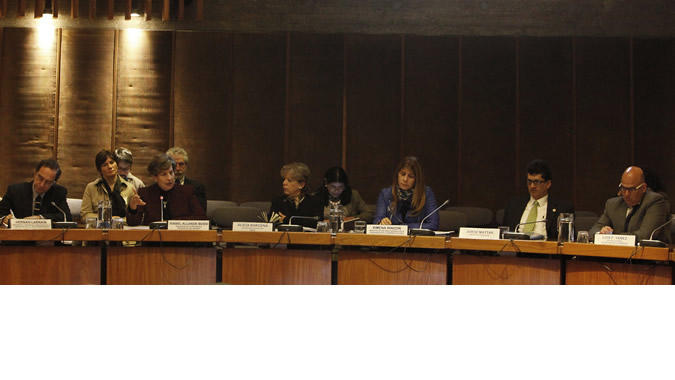Chile Launches Action Plan on Open Government for 2014-2016 at ECLAC Headquarters
Work area(s)
The United Nations regional commission welcomes the adoption by 15 of the region’s countries of commitments to improve transparency and citizen participation.

(21 August, 2014) Today the Executive Secretary of the Economic Commission for Latin America and the Caribbean (ECLAC), Alicia Bárcena, welcomed senior Chilean authorities including Minister of the General Secretariat of the Presidency, Ximena Rincón; President of the Senate, Isabel Allende; and Senator Hernán Larraín to the headquarters for the launch of Chile’s Action Plan for Open Government 2014-2016.
The most senior ECLAC official welcomed the fact that 15 of the region’s countries, including Chile, have adopted commitments to improve transparency and citizen participation within the Open Government Partnership (OGP), which is a voluntary multilateral initiative launched in September 2011 during the 66th session of the United Nations General Assembly.
According to Minister Ximena Rincón “The new action plan we are presenting today is a set of 12 firm initiatives in the various areas of institutional affairs, and it reaffirms Chile’s commitment to promoting policies of citizen participation, the fight against corruption, citizen empowerment and open government, as well as continuing to tackle the shared challenges facing the countries of the Open Government Partnership”.
Isabel Allende stated that this plan “is already becoming a State policy, independent of governments, for advancing towards basic pillars such as transparency, access to information and institutional modernization”. The President of the Senate added “An electoral democracy is no longer enough. Now we have to work towards a more citizen-centred democracy”.
Alicia Bárcena emphasized that ECLAC calls for an end to the culture of privilege that prevailed for so many decades, in order to make way for a culture of equality in the region.
The Executive Secretary stated “The aim is to create citizenship that is fully based on rights and participation. This is the framework in which we understand the key role of open government”. She affirmed that these initiatives have implications not only for republican institutions (the Executive, Legislature and Judiciary) but also for society, which is expected to be more responsible, and the private sector, which is expected to be more transparent.
The launch was also attended by President of the Pro-transparency Bicameral Commission, Hernán Larraín, who took part in the panel discussion on Chile’s Action Plan.
The aim of the Partnership is for governments to work with local civil society to develop and implement a national action plan for open government that includes commitments to promote transparency, empower citizens, combat corruption and harness new technologies to strengthen governance.
This initiative currently has 64 participating countries, with 15 from Latin America and the Caribbean: Argentina, Brazil, Chile, Colombia, Costa Rica, Dominican Republic, El Salvador, Guatemala, Honduras, Mexico, Panama, Paraguay, Peru, Trinidad and Tobago and Uruguay.
In keeping with ECLAC recommendations for greater equality and inclusion, since 2011 the Commission has been working through the Latin American and Caribbean Institute for Economic and Social Planning (ILPES) to make progress in e-government and open government, with a view to supporting the region’s countries in improving public management.
The Action Plan presented today by Chile incorporates ILPES recommendations, and its 12 commitments include the implementation of the municipal transparency management model, the implementation and monitoring of a lobbying law, the development of a public-health gateway and the strengthening of environmental democracy.
The document is also a continuation of the first plan for 2012-2013, which had 19 commitments that were 79 % fulfilled.
Related content
Seminario sobre Gobierno Abierto y el lanzamiento del Plan de Acción del Gobierno de Chile para el Open Government Partnership 2014-2016
Intervención de Alicia Bárcena, Secretaria Ejecutiva de la CEPAL.
Related link(s)
Country(ies)
-
Chile